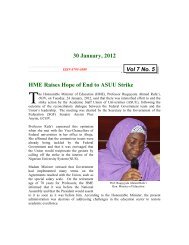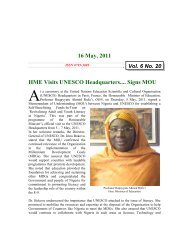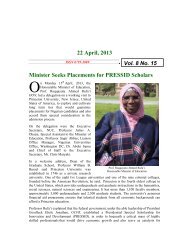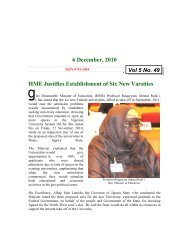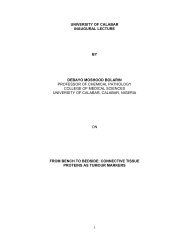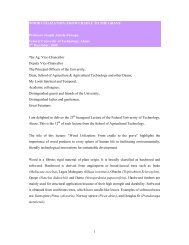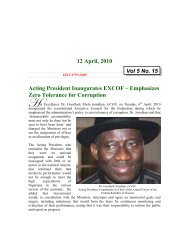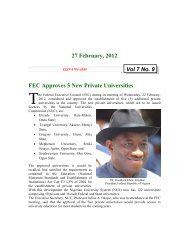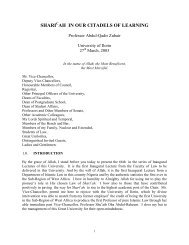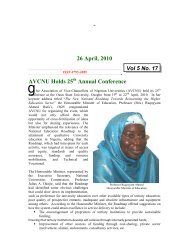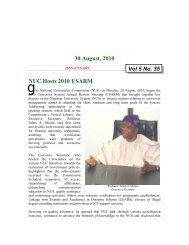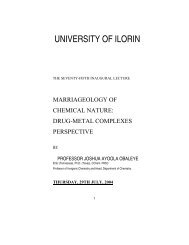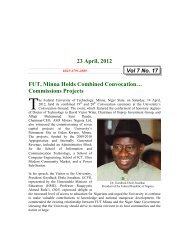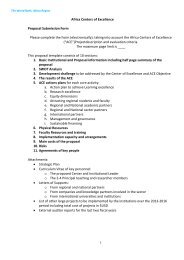From State And State Power To Man And Social - National ...
From State And State Power To Man And Social - National ...
From State And State Power To Man And Social - National ...
You also want an ePaper? Increase the reach of your titles
YUMPU automatically turns print PDFs into web optimized ePapers that Google loves.
of under-developed countries need to take steps to secure access to modern scientific knowledgeand technology through expanding and improving their tertiary education facilities, embarkingon sustained efforts at methodically studying and imitating the production of modern industrialmachines and equipment, and by entering into specific contractual agreements on patents,licensing and know-how with willing foreign companies.What this study reveals about international relations is that the real actors are humangroups: owners of finance capital and technology in the shape of multinationalcorporations; bureaucrats and politicians, acting on behalf of states; the workers inunderdeveloped countries, engaged in production, distribution and exchange; and the restof the population, as consumers of products, distributors of products, but mostimportantly, as victims of exploitation by the multinational corporations, working incollaboration with the ruling class of the underdeveloped countries.. International relationsis about the food we eat, the house we live in, the clothes we wear. It is about the choice wemake between drinking coca kola, whose taste formula is imported, and taking the orangejuice/drink pressed out by members of our family from the fruits of the orange treesbehind our house. It is about the choice we make between going to Mr. Biggs for launch orpatronizing the restaurant run by the University of Nigeria General Enterprises Limited.At bottom, international relations is very much about lifting millions of people frompoverty, about saving them from ignorance, hunger, and disease. It is fundamentally abouthuman welfare. However, it is also basically about profit, profit-maximization,accumulation of capital, and repatriation of capital, investment of capital in production,trade and commerce. The study of international relations is concerned only secondarily,and superficially with state power; it is much less about struggle for state power. Strugglefor state power is the scaffolding rather than the foundation of international relations. Theproblem is that, hitherto, struggle for power among states had been treated and taught, not just asthe basis, but indeed, the essence of international politics. Perhaps, this misrepresentation flowsdirectly from the misreading of Machiavelli’s political thought.The Meaning and Scope of International Relations.<strong>To</strong> fully appreciate the denotation and connotation of the subject matter, which is my secondlove, we need to go back to the roots. In its classical usage, the word international means interstate.Apparently, the term, jus gentium, a Latin phrase, meaning the law of nations, was firstused by the English philosopher, Jeremy Bentham, in the later part of the 18 th century, althougha Latin equivalent of inter-state, inter-gentes, is said to have been used much earlier by RichardZouche, a professor of civil law in Oxford University and one of the classical writers oninternational law. Zouche used the term a century earlier.[Robert L. Pfaltsgraff Jr., Politics andthe International System, pp.1-6]Both Bentham and Zouche used the term to describe the branches of the law of nations or “jusgentium”, which referred to the legal principles applied by Roman officials in cases involvingnon-Romans. Using the term, “international law” as a translation of “jus gentium”, was,however, a mistake, because the body of rules referred to as “jus gentium” by the Romans wascontrolled by Rome itself, and governed relations between the Romans and the tribes of Italy,31



